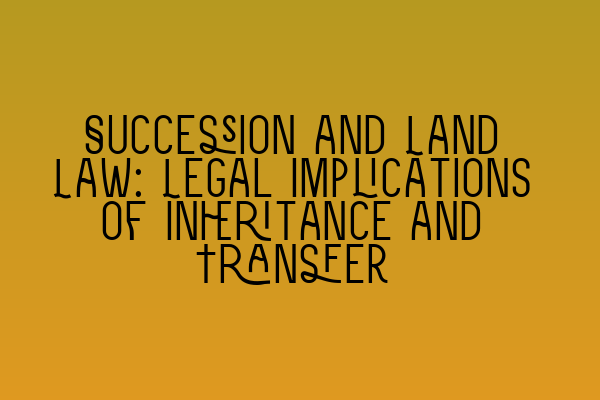**Succession and Land Law: Legal Implications of Inheritance and Transfer**
Welcome to the SQE Property Law & Land Law blog! In this article, we will explore the fascinating realm of succession and land law, and delve into the legal implications of inheritance and transfer.
Succession, in the context of land law, refers to the transfer of property rights from one person to another upon their death. It is a complex area that requires careful consideration of various legal principles, including wills, intestacy, and the rules of descent and distribution. Understanding these concepts is crucial for both solicitors and individuals navigating the intricacies of inheritance and property transfer.
Let’s start by examining the process of succession through a will. A will is a legal document that outlines a person’s wishes regarding the distribution of their property after death. It allows individuals to have control over who inherits their estate and how it is divided. By following the proper legal procedures, a will can provide a smooth transfer of property rights, minimizing disputes and ensuring that the deceased’s wishes are respected.
However, in cases where a person dies without a valid will, their estate is considered intestate. This means that the distribution of their property will be determined by the rules of intestacy, which vary depending on the jurisdiction. The rules of intestacy aim to distribute the estate in a fair and equitable manner among the deceased’s surviving relatives. Understanding these rules is important for both solicitors advising clients on intestate succession and individuals who may stand to inherit under such circumstances.
In addition to wills and intestacy, the rules of descent and distribution also play a significant role in succession and land law. These rules determine the order of priority for individuals who are entitled to inherit in the absence of a will or under specific circumstances. They often prioritize close relatives, such as spouses, children, and parents, while excluding more distant relatives. Being familiar with these rules is crucial for solicitors handling succession matters and for individuals who wish to understand their rights and entitlements when it comes to inheritance.
Now, let’s delve into the legal implications of succession and land law. When a person inherits property, they become the legal owner and are responsible for managing and maintaining it. This ownership comes with various rights and responsibilities, including the right to occupy the property, the right to sell or transfer it, and the responsibility to pay any associated taxes and fees.
One key consideration in succession and land law is the concept of ownership rights. Depending on the jurisdiction, ownership can take various forms, such as freehold or leasehold. Freehold ownership grants the owner full and absolute ownership of the property, while leasehold ownership involves a lease agreement with the owner of the freehold. Understanding these various forms of ownership is crucial for solicitors advising clients on succession matters, as it may impact the transferability and value of the inherited property.
Another important aspect of succession and land law is the concept of co-ownership. In some cases, multiple individuals may inherit a property together, either through joint tenancy or tenancy in common. Joint tenancy grants each co-owner an equal share in the property, and in the event of a co-owner’s death, their share automatically passes to the surviving co-owners. Tenancy in common, on the other hand, allows co-owners to hold unequal shares in the property, and their share can be freely transferred or inherited according to their will or the rules of intestacy. Understanding these forms of co-ownership is essential for solicitors handling succession matters, as it influences the rights and obligations of the co-owners.
In conclusion, succession and land law encompass a wide range of legal principles and considerations when it comes to the transfer of property rights upon death. Whether it involves drafting a will, navigating intestacy rules, understanding inheritance rights, or dealing with different forms of ownership, solicitors at SQE Property Law & Land Law play a crucial role in guiding individuals through this complex area of law.
If you’re studying for the SQE exams, check out our related articles on SQE 1 Practice Exam Questions, SQE 1 Practice Mocks FLK1 FLK2, SQE 2 Preparation Courses, SQE 1 Preparation Courses, and SRA SQE Exam Dates. These resources will provide valuable insights and help you prepare for success in your examinations.
Stay tuned to our blog for more informative articles on property law, land law, and other legal topics. Thank you for reading!
References:
– SQE 1 Practice Exam Questions
– SQE 1 Practice Mocks FLK1 FLK2
– SQE 2 Preparation Courses
– SQE 1 Preparation Courses
– SRA SQE Exam Dates
